Management Accounting Assignment: Strategic and Tactical Planning
VerifiedAdded on 2020/03/16
|6
|1030
|37
Homework Assignment
AI Summary
This assignment explores the shift towards a flow and process-oriented view in management accounting, discussing its rationales from strategic, tactical, and operational perspectives. It analyzes how this shift influences contemporary management accounting by integrating strategic business objectives and providing a forward-looking model for decision-making. The assignment also delves into the strategic role of management accounting, exemplified through planning areas, and highlights the importance of management accountants in supporting strategic planning, setting profitability goals, creating acquisition strategies, and providing risk management and control support. The document references key academic sources to support its arguments, offering a comprehensive overview of management accounting principles and practices.
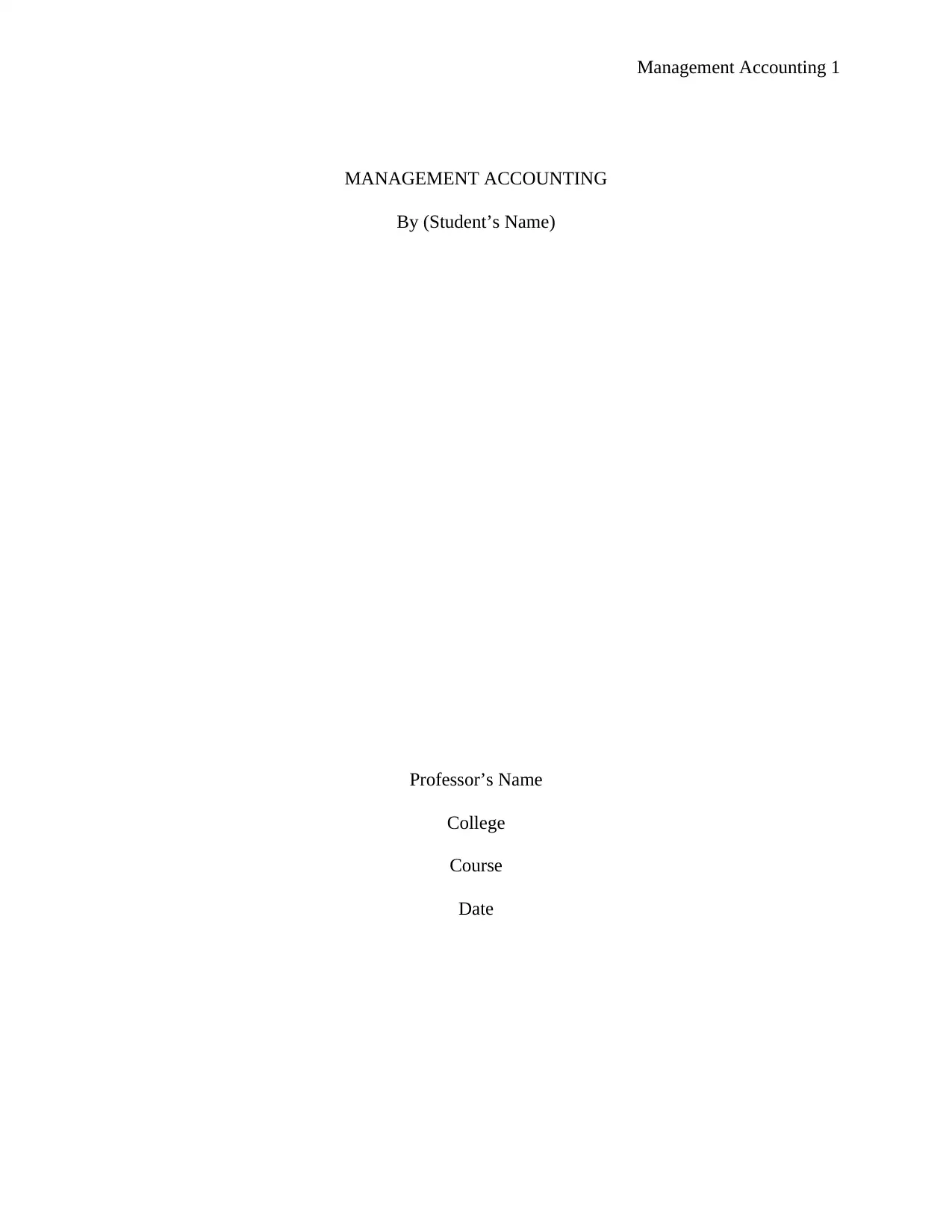
Management Accounting 1
MANAGEMENT ACCOUNTING
By (Student’s Name)
Professor’s Name
College
Course
Date
MANAGEMENT ACCOUNTING
By (Student’s Name)
Professor’s Name
College
Course
Date
Paraphrase This Document
Need a fresh take? Get an instant paraphrase of this document with our AI Paraphraser
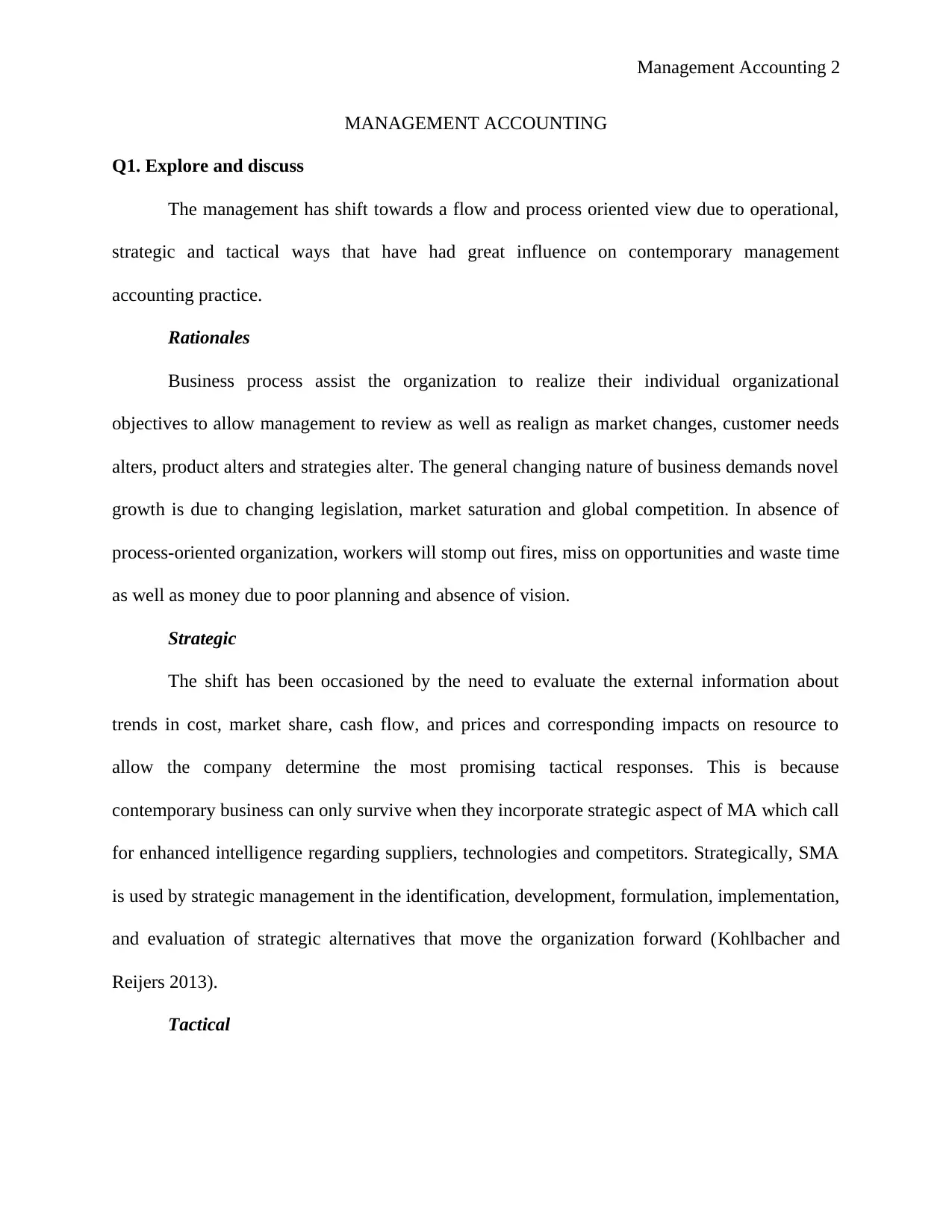
Management Accounting 2
MANAGEMENT ACCOUNTING
Q1. Explore and discuss
The management has shift towards a flow and process oriented view due to operational,
strategic and tactical ways that have had great influence on contemporary management
accounting practice.
Rationales
Business process assist the organization to realize their individual organizational
objectives to allow management to review as well as realign as market changes, customer needs
alters, product alters and strategies alter. The general changing nature of business demands novel
growth is due to changing legislation, market saturation and global competition. In absence of
process-oriented organization, workers will stomp out fires, miss on opportunities and waste time
as well as money due to poor planning and absence of vision.
Strategic
The shift has been occasioned by the need to evaluate the external information about
trends in cost, market share, cash flow, and prices and corresponding impacts on resource to
allow the company determine the most promising tactical responses. This is because
contemporary business can only survive when they incorporate strategic aspect of MA which call
for enhanced intelligence regarding suppliers, technologies and competitors. Strategically, SMA
is used by strategic management in the identification, development, formulation, implementation,
and evaluation of strategic alternatives that move the organization forward (Kohlbacher and
Reijers 2013).
Tactical
MANAGEMENT ACCOUNTING
Q1. Explore and discuss
The management has shift towards a flow and process oriented view due to operational,
strategic and tactical ways that have had great influence on contemporary management
accounting practice.
Rationales
Business process assist the organization to realize their individual organizational
objectives to allow management to review as well as realign as market changes, customer needs
alters, product alters and strategies alter. The general changing nature of business demands novel
growth is due to changing legislation, market saturation and global competition. In absence of
process-oriented organization, workers will stomp out fires, miss on opportunities and waste time
as well as money due to poor planning and absence of vision.
Strategic
The shift has been occasioned by the need to evaluate the external information about
trends in cost, market share, cash flow, and prices and corresponding impacts on resource to
allow the company determine the most promising tactical responses. This is because
contemporary business can only survive when they incorporate strategic aspect of MA which call
for enhanced intelligence regarding suppliers, technologies and competitors. Strategically, SMA
is used by strategic management in the identification, development, formulation, implementation,
and evaluation of strategic alternatives that move the organization forward (Kohlbacher and
Reijers 2013).
Tactical
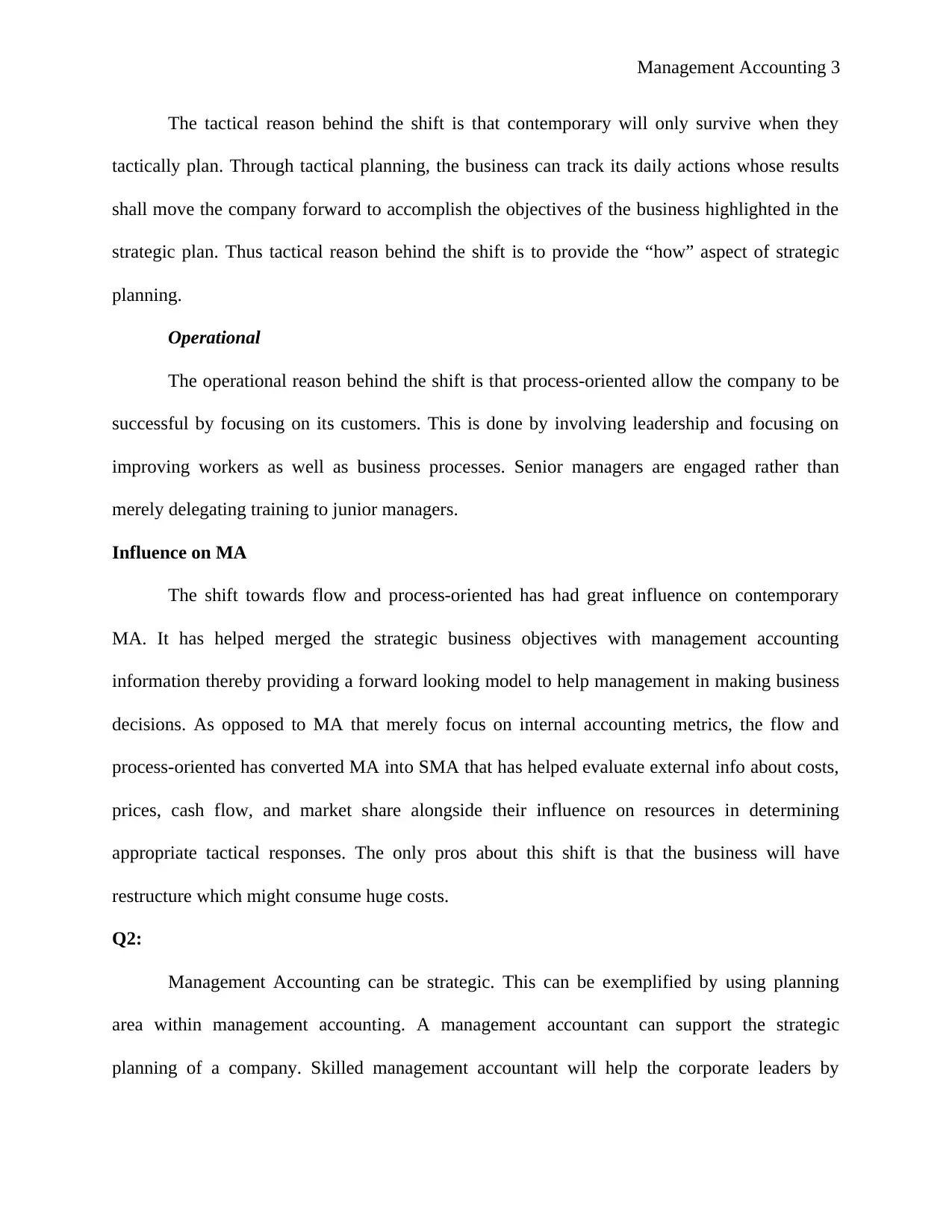
Management Accounting 3
The tactical reason behind the shift is that contemporary will only survive when they
tactically plan. Through tactical planning, the business can track its daily actions whose results
shall move the company forward to accomplish the objectives of the business highlighted in the
strategic plan. Thus tactical reason behind the shift is to provide the “how” aspect of strategic
planning.
Operational
The operational reason behind the shift is that process-oriented allow the company to be
successful by focusing on its customers. This is done by involving leadership and focusing on
improving workers as well as business processes. Senior managers are engaged rather than
merely delegating training to junior managers.
Influence on MA
The shift towards flow and process-oriented has had great influence on contemporary
MA. It has helped merged the strategic business objectives with management accounting
information thereby providing a forward looking model to help management in making business
decisions. As opposed to MA that merely focus on internal accounting metrics, the flow and
process-oriented has converted MA into SMA that has helped evaluate external info about costs,
prices, cash flow, and market share alongside their influence on resources in determining
appropriate tactical responses. The only pros about this shift is that the business will have
restructure which might consume huge costs.
Q2:
Management Accounting can be strategic. This can be exemplified by using planning
area within management accounting. A management accountant can support the strategic
planning of a company. Skilled management accountant will help the corporate leaders by
The tactical reason behind the shift is that contemporary will only survive when they
tactically plan. Through tactical planning, the business can track its daily actions whose results
shall move the company forward to accomplish the objectives of the business highlighted in the
strategic plan. Thus tactical reason behind the shift is to provide the “how” aspect of strategic
planning.
Operational
The operational reason behind the shift is that process-oriented allow the company to be
successful by focusing on its customers. This is done by involving leadership and focusing on
improving workers as well as business processes. Senior managers are engaged rather than
merely delegating training to junior managers.
Influence on MA
The shift towards flow and process-oriented has had great influence on contemporary
MA. It has helped merged the strategic business objectives with management accounting
information thereby providing a forward looking model to help management in making business
decisions. As opposed to MA that merely focus on internal accounting metrics, the flow and
process-oriented has converted MA into SMA that has helped evaluate external info about costs,
prices, cash flow, and market share alongside their influence on resources in determining
appropriate tactical responses. The only pros about this shift is that the business will have
restructure which might consume huge costs.
Q2:
Management Accounting can be strategic. This can be exemplified by using planning
area within management accounting. A management accountant can support the strategic
planning of a company. Skilled management accountant will help the corporate leaders by
⊘ This is a preview!⊘
Do you want full access?
Subscribe today to unlock all pages.

Trusted by 1+ million students worldwide
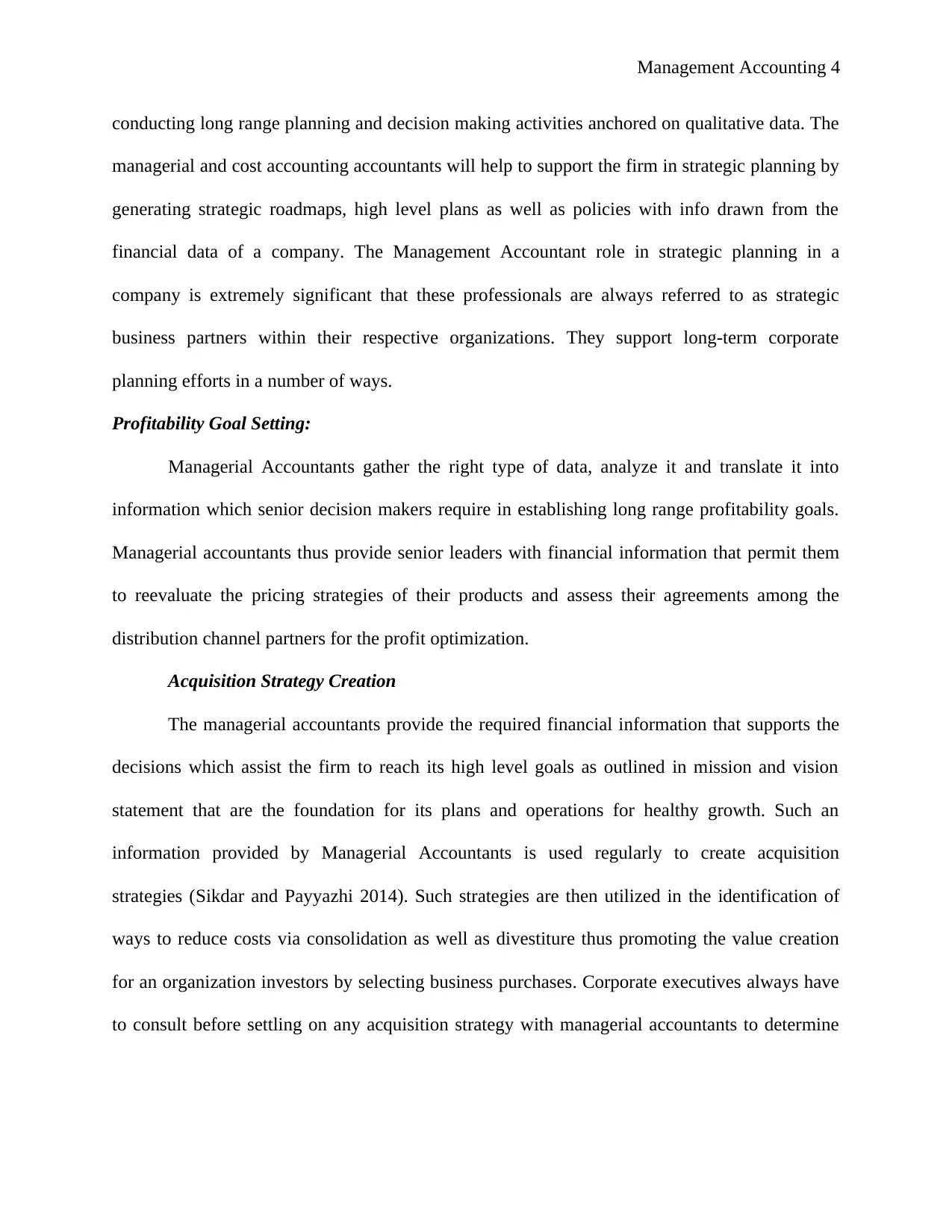
Management Accounting 4
conducting long range planning and decision making activities anchored on qualitative data. The
managerial and cost accounting accountants will help to support the firm in strategic planning by
generating strategic roadmaps, high level plans as well as policies with info drawn from the
financial data of a company. The Management Accountant role in strategic planning in a
company is extremely significant that these professionals are always referred to as strategic
business partners within their respective organizations. They support long-term corporate
planning efforts in a number of ways.
Profitability Goal Setting:
Managerial Accountants gather the right type of data, analyze it and translate it into
information which senior decision makers require in establishing long range profitability goals.
Managerial accountants thus provide senior leaders with financial information that permit them
to reevaluate the pricing strategies of their products and assess their agreements among the
distribution channel partners for the profit optimization.
Acquisition Strategy Creation
The managerial accountants provide the required financial information that supports the
decisions which assist the firm to reach its high level goals as outlined in mission and vision
statement that are the foundation for its plans and operations for healthy growth. Such an
information provided by Managerial Accountants is used regularly to create acquisition
strategies (Sikdar and Payyazhi 2014). Such strategies are then utilized in the identification of
ways to reduce costs via consolidation as well as divestiture thus promoting the value creation
for an organization investors by selecting business purchases. Corporate executives always have
to consult before settling on any acquisition strategy with managerial accountants to determine
conducting long range planning and decision making activities anchored on qualitative data. The
managerial and cost accounting accountants will help to support the firm in strategic planning by
generating strategic roadmaps, high level plans as well as policies with info drawn from the
financial data of a company. The Management Accountant role in strategic planning in a
company is extremely significant that these professionals are always referred to as strategic
business partners within their respective organizations. They support long-term corporate
planning efforts in a number of ways.
Profitability Goal Setting:
Managerial Accountants gather the right type of data, analyze it and translate it into
information which senior decision makers require in establishing long range profitability goals.
Managerial accountants thus provide senior leaders with financial information that permit them
to reevaluate the pricing strategies of their products and assess their agreements among the
distribution channel partners for the profit optimization.
Acquisition Strategy Creation
The managerial accountants provide the required financial information that supports the
decisions which assist the firm to reach its high level goals as outlined in mission and vision
statement that are the foundation for its plans and operations for healthy growth. Such an
information provided by Managerial Accountants is used regularly to create acquisition
strategies (Sikdar and Payyazhi 2014). Such strategies are then utilized in the identification of
ways to reduce costs via consolidation as well as divestiture thus promoting the value creation
for an organization investors by selecting business purchases. Corporate executives always have
to consult before settling on any acquisition strategy with managerial accountants to determine
Paraphrase This Document
Need a fresh take? Get an instant paraphrase of this document with our AI Paraphraser
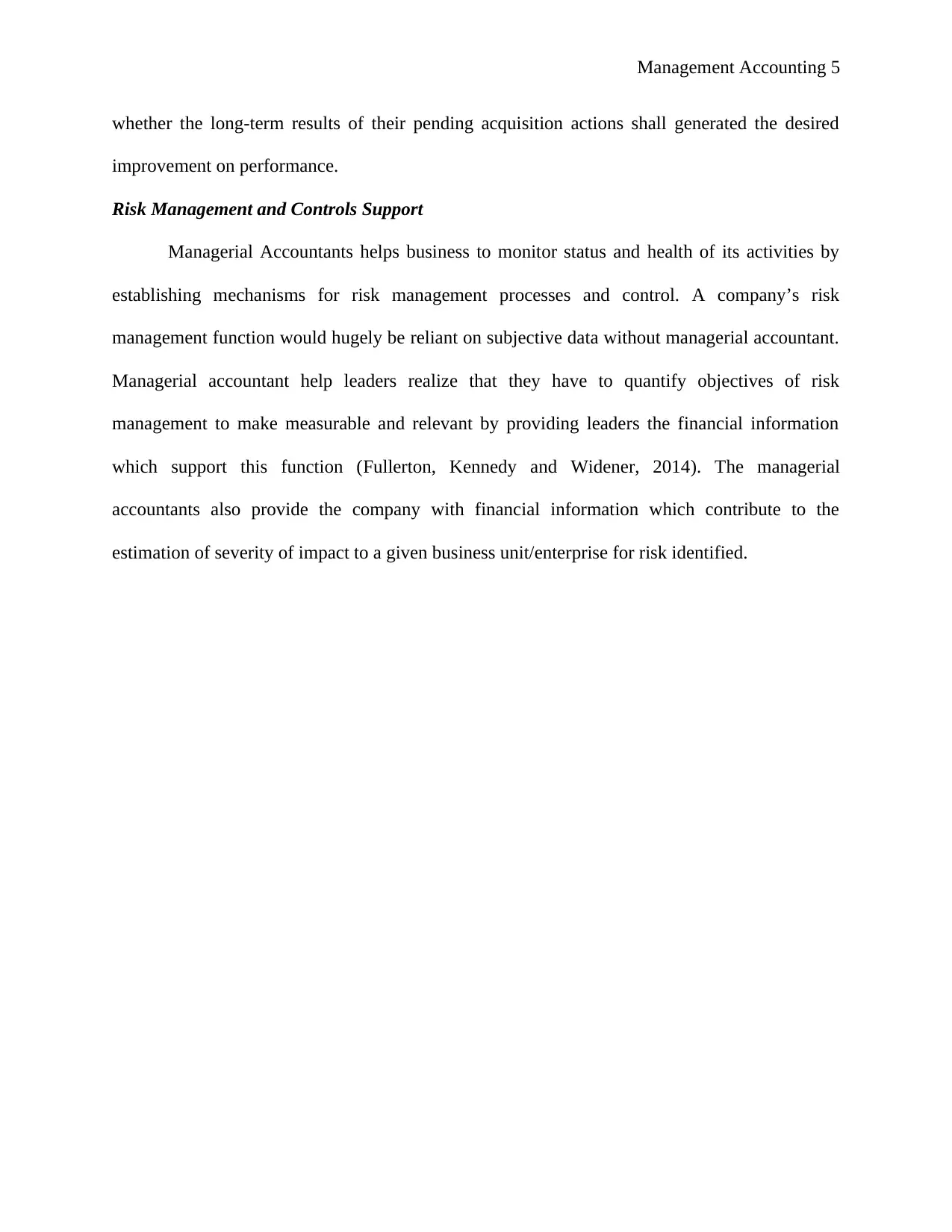
Management Accounting 5
whether the long-term results of their pending acquisition actions shall generated the desired
improvement on performance.
Risk Management and Controls Support
Managerial Accountants helps business to monitor status and health of its activities by
establishing mechanisms for risk management processes and control. A company’s risk
management function would hugely be reliant on subjective data without managerial accountant.
Managerial accountant help leaders realize that they have to quantify objectives of risk
management to make measurable and relevant by providing leaders the financial information
which support this function (Fullerton, Kennedy and Widener, 2014). The managerial
accountants also provide the company with financial information which contribute to the
estimation of severity of impact to a given business unit/enterprise for risk identified.
whether the long-term results of their pending acquisition actions shall generated the desired
improvement on performance.
Risk Management and Controls Support
Managerial Accountants helps business to monitor status and health of its activities by
establishing mechanisms for risk management processes and control. A company’s risk
management function would hugely be reliant on subjective data without managerial accountant.
Managerial accountant help leaders realize that they have to quantify objectives of risk
management to make measurable and relevant by providing leaders the financial information
which support this function (Fullerton, Kennedy and Widener, 2014). The managerial
accountants also provide the company with financial information which contribute to the
estimation of severity of impact to a given business unit/enterprise for risk identified.
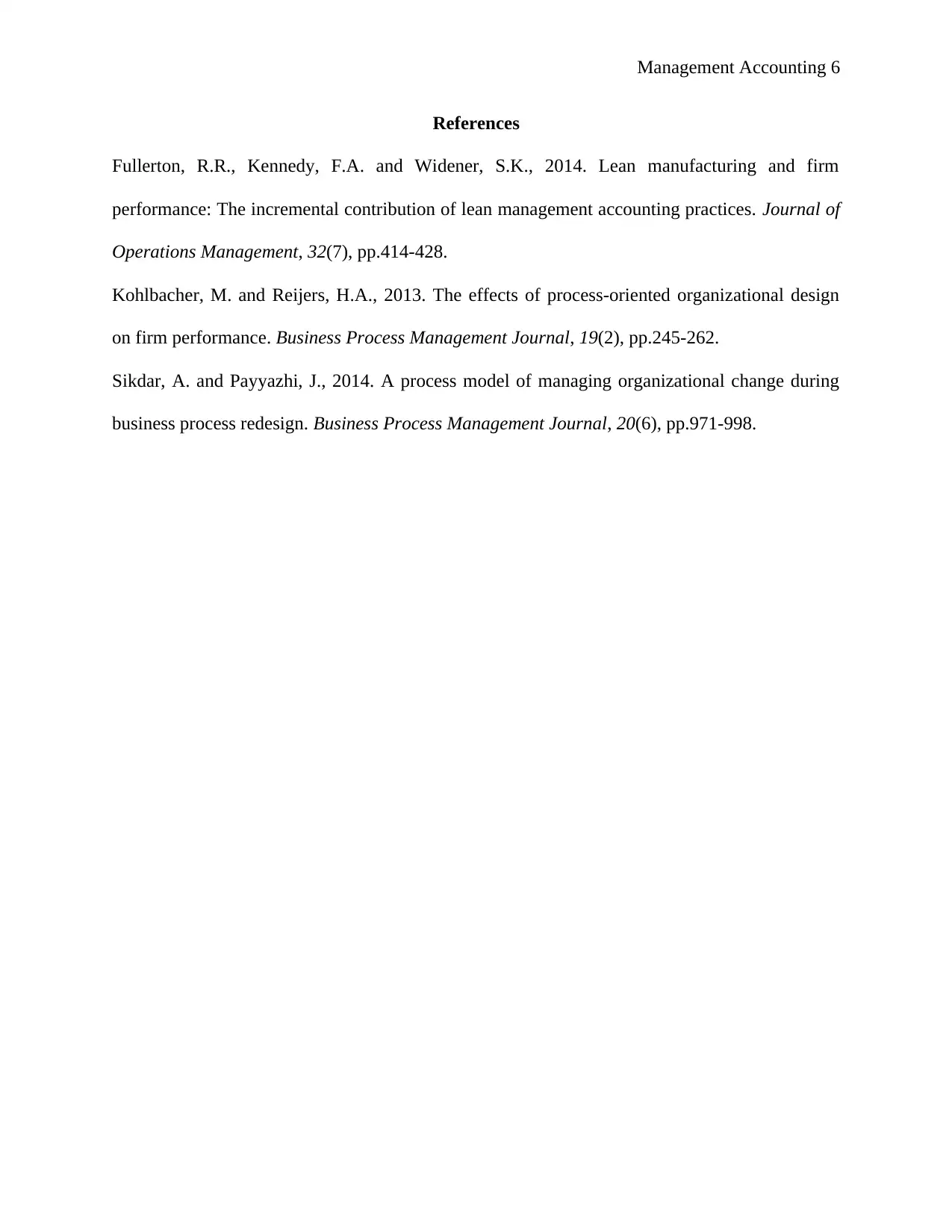
Management Accounting 6
References
Fullerton, R.R., Kennedy, F.A. and Widener, S.K., 2014. Lean manufacturing and firm
performance: The incremental contribution of lean management accounting practices. Journal of
Operations Management, 32(7), pp.414-428.
Kohlbacher, M. and Reijers, H.A., 2013. The effects of process-oriented organizational design
on firm performance. Business Process Management Journal, 19(2), pp.245-262.
Sikdar, A. and Payyazhi, J., 2014. A process model of managing organizational change during
business process redesign. Business Process Management Journal, 20(6), pp.971-998.
References
Fullerton, R.R., Kennedy, F.A. and Widener, S.K., 2014. Lean manufacturing and firm
performance: The incremental contribution of lean management accounting practices. Journal of
Operations Management, 32(7), pp.414-428.
Kohlbacher, M. and Reijers, H.A., 2013. The effects of process-oriented organizational design
on firm performance. Business Process Management Journal, 19(2), pp.245-262.
Sikdar, A. and Payyazhi, J., 2014. A process model of managing organizational change during
business process redesign. Business Process Management Journal, 20(6), pp.971-998.
⊘ This is a preview!⊘
Do you want full access?
Subscribe today to unlock all pages.

Trusted by 1+ million students worldwide
1 out of 6
Related Documents
Your All-in-One AI-Powered Toolkit for Academic Success.
+13062052269
info@desklib.com
Available 24*7 on WhatsApp / Email
![[object Object]](/_next/static/media/star-bottom.7253800d.svg)
Unlock your academic potential
Copyright © 2020–2025 A2Z Services. All Rights Reserved. Developed and managed by ZUCOL.




